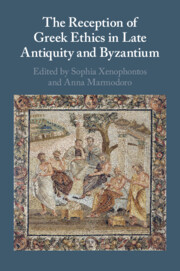Book contents
- The Reception of Greek Ethics in Late Antiquity and Byzantium
- The Reception of Greek Ethics in Late Antiquity and Byzantium
- Copyright page
- Contents
- Tables
- Contributors
- Acknowledgements
- Abbreviations
- Introduction
- Part I Ethics across the Late-antique and Byzantine Period
- Chapter 1 Sexual Difference and the Difference It Makes
- Chapter 2 Ethics and the Hierarchy of Virtues from Plotinus to Iamblichus
- Chapter 3 Neoplatonic Contemplative Ethics
- Chapter 4 Ethics, Virtue and Theurgy
- Chapter 5 Imitation and Self-Examination
- Chapter 6 The Reception of Greek Ethics in Christian Monastic Writings
- Chapter 7 Understanding Self-Determination and Moral Selfhood in the Sources of Late-antique and Byzantine Christian Thought
- Chapter 8 ‘Singing with David and Contemplating Agesilaus’
- Part II Prominent Ethical Views of the Time
- Bibliography
- Index Locorum
- Index of Names and Subjects
Chapter 1 - Sexual Difference and the Difference It Makes
The Greek Fathers and Their Sources
from Part I - Ethics across the Late-antique and Byzantine Period
Published online by Cambridge University Press: 15 June 2021
- The Reception of Greek Ethics in Late Antiquity and Byzantium
- The Reception of Greek Ethics in Late Antiquity and Byzantium
- Copyright page
- Contents
- Tables
- Contributors
- Acknowledgements
- Abbreviations
- Introduction
- Part I Ethics across the Late-antique and Byzantine Period
- Chapter 1 Sexual Difference and the Difference It Makes
- Chapter 2 Ethics and the Hierarchy of Virtues from Plotinus to Iamblichus
- Chapter 3 Neoplatonic Contemplative Ethics
- Chapter 4 Ethics, Virtue and Theurgy
- Chapter 5 Imitation and Self-Examination
- Chapter 6 The Reception of Greek Ethics in Christian Monastic Writings
- Chapter 7 Understanding Self-Determination and Moral Selfhood in the Sources of Late-antique and Byzantine Christian Thought
- Chapter 8 ‘Singing with David and Contemplating Agesilaus’
- Part II Prominent Ethical Views of the Time
- Bibliography
- Index Locorum
- Index of Names and Subjects
Summary
The transformation of the ancient world from paganism to Christianity brought with it not only a new set of ethical injunctions, but a new 'moral cosmology'—that is, a new way of conceiving of humanity in relation to God and the cosmos. One important element of such a moral cosmology is the distinction between the sexes. Why did God create humanity in two sexes, and what is the ultimate meaning of one’s sexual identity? The thought of the Greek Fathers on this subject was heavily indebted to that of Greek philosophy, especially Plato. For Plato the soul is fundamentally sexless and acquires sexual identity only upon embodiment. Although Christians (with the exception of Origen) generally rejected the pre-existence of the soul, they accepted the premise that the soul itself is intrinsically sexless. Many carried this further to the conclusion that in the afterlife there will be a gradual movement away from our current sexual condition to a higher, asexual form of existence. This chapter traces the development of such views from Plato through Gregory of Nyssa and Maximus the Confessor. It further argues that on this point Christian authors accepted the pagan philosophical inheritance rather too uncritically, and that a careful consideration of their rejection of metempsychosis suggests a very different view.
- Type
- Chapter
- Information
- Publisher: Cambridge University PressPrint publication year: 2021
- 1
- Cited by

